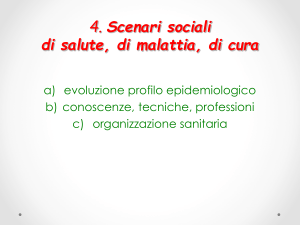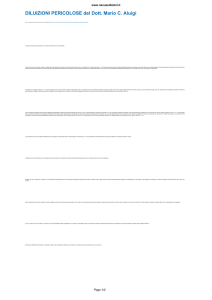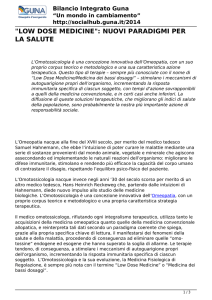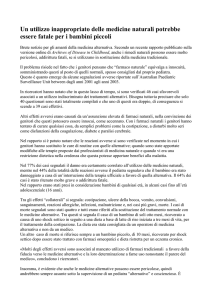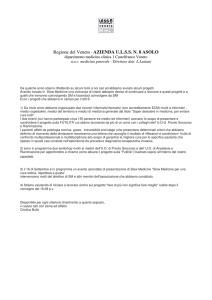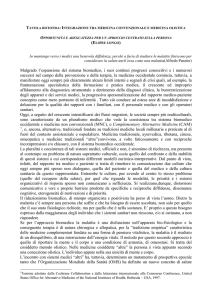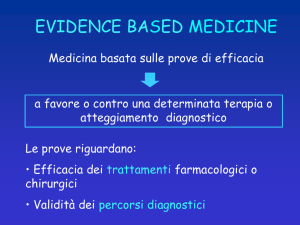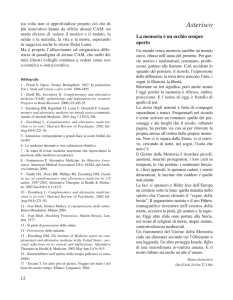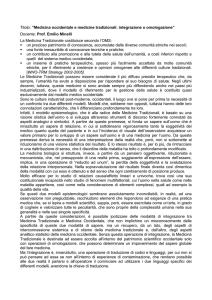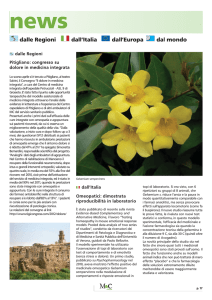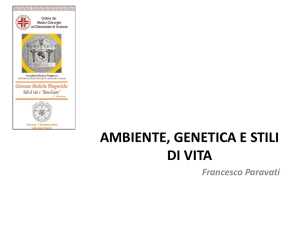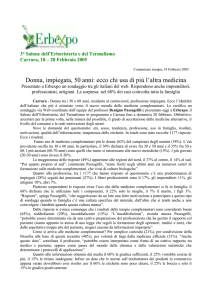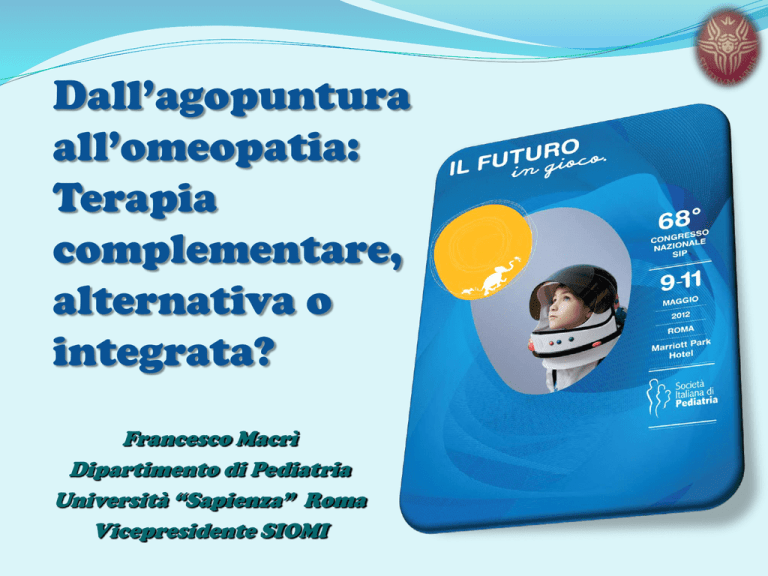
Dall’agopuntura
all’omeopatia:
Terapia
complementare,
alternativa o
integrata?
Francesco Macrì
Dipartimento di Pediatria
Università “Sapienza” Roma
Vicepresidente SIOMI
Il 15% degli Italiani ricorre alle
Medicine Complementari
( Dati EURISPES 2010 )
E.Ernst, Journal of Asthma, 1998; 35(8):667-671
E.Ernst, Journal of Asthma, 1998; 35(8):667-671
P. Colin
“Homeopathy and respiratory allergies: a
series of 147 cases”
Homeopathy 2006, 95:68-72.
Un’efficace definizione di cosa intende la
letteratura medica corrente per
INTEGRAZIONE è definita in un editoriale
intitolato “Integrated medicine” (Medicina
integrata) pubblicato dal BMJ (British Medical
Journal) nel gennaio 2001:
“La medicina integrata è praticare la medicina in
modo da incorporare elementi delle pratiche
complementari ed alternative nei piani
preventivi e terapeutici, a fianco dei metodi
diagnostici e terapeutici ortodossi.”
I fondamenti della
Biomedicina
“We value the preservation of structure
over the preservation of function. We value
the body over the person, we value survival
over maximum function, and length of life
over quality of life”
Eric J. Cassell, The Sorcerer’s Broom: Medicine’s Rampant Technology (1993)
L.Launsø, J. Rieper, “General practitioners and classical homeopaths treatment
models for asthma and allergy”, Homeopathy 2005, 94:17-25.
“Nonostante la natura frammentaria della
evidenza, ci sono buone ragioni per ritenere
che diverse medicine complementari ed
alternative offrono possibilità di risparmi
significativi nelle spese sanitarie”
Cristopher Smallwood BMJ, Ottobre 2005
Homeopathy. 2009 Jan;98(1):2-10.
Cost-benefit evaluation of homeopathic
versus conventional therapy in respiratory
diseases.
Rossi E, Crudeli L, Endrizzi C, Garibaldi D.
Source
Homeopathic Clinic, Campo di Marte Hospital, Lucca, Homeopathic Reference Centre Region of Tuscany,
Italy. [email protected]
PAZIENTI CON RIDUZIONE DEL 50% RICORSO A
TERAPIA TRADIZIONALE PER FASE ACUTA
52%
45%
ASMA
47%
RINITE
37%
DERMATITE
25%
10%
6 MESI
12 MESI
Macrì et al, 2002
Antropologia
della malattia
F. Laplantine, Ed. Sansoni, Milano, 1988
I concetti alla base della possibilità di interpretare le malattie (e,
quindi, di gestirne la cura) non sono numerosi…
L’AGGIUNTIVO
LA SOSTANZA
IL MONISMO
L’INTERNO
L’INIBIZIONE
LA QUANTITA’
L’OMOGENEO
L’INDIVIDUALE
IL SIMILE
LA NATURA
IL SOTTRATTIVO
LA RELAZIONE
IL DUALISMO
L’ESTERNO
LA STIMOLAZIONE
LA QUALITA’
L’ETEROGENEO
IL SOCIALE
IL CONTRARIO
LA CULTURA
Modelli di Malattia
• Additivo - Sottrattivo
• Esogeno - Endogeno
• Benefico - Malefico
• Ontologico - Relazionale
…..e così i modelli di terapia
che ne derivano:
Allopatico – Omeopatico
Esorcistico – Adorcistico
Sedativo - Eccitativo
La nascita della EBM
JAMA, 4 nov 1992, 268: 2420-2425
Evidence Based Medicine,
a new approach to teaching
the practice of medicine
EBM Working Group
Si costituiscono canoni prestabiliti per clinica e terapia!
“..non scoprire una evidente truffa è un segno non incoraggiante “
BMJ - 18-25 DECEMBER 2010 - VOLUME 341 – J.C. McLachlan
La validità di una raccomandazione all’utilizzo
di una terapia non si basa più esclusivamente sulla robustezza
dello studio scientifico, ma anche su altri parametri:
costo e reperibilità del farmaco, orientamento del paziente, etc.
Raccogliere i dati
Dean et al, Homeopathy, 2007, 96: 42-45
Jacobs et al, Ped Inf Dis J, 2003, 22: 229-234
Taylor MA, Reilly et al, BMJ 2000; 321: 471-6
Am J of infectious diseases 6 (2) 24-28, 2010
Possibile ruolo di intervento delle
CAM nell’asma bronchiale
Livelli terapeutici
Sintomi IRB Atopia
Agopuntura
++
±
-
Fitoterapia
+
+
+
Omeopatia
++
±
++
Target terapeutico
Intervento possibile
-Tosse
-Dispnea
-IRB, flogosi mucosale
-Sensibilizzazione allergica
-Controllo sintomi
-Risoluzione
-β2, Omeopatia
-Agop., β2,Cs,Omeop.
-AntiLT,Cs, Fito
-Isoterapia, ITS
-Linee Guida
?
ANDAMENTO DEI SINTOMI
80%
49%
50%
74%
70%
50%
<< CAMPIONE A
asma
rinite
dermatite
follow-up a
6mesi
follow-up a 12
mesi
Pazienti con
miglioramento
del 50%
68%
50%
asma
41%
52%
41%
rinite
CAMPIONE B >>
dermatite
0
follow-up a 6
mesi
follow-up a
12 mesi
Integrative medicine and asthma
Mark JD
Childhood asthma is a spectrum of symptoms and
clinical presentations. The treatment begins with
developing goals of therapy for a child by the health
care provider, the family, and the child as a team.
The primary objective is to reduce symptoms and
exacerbations using therapies that include
conventional medications, environmental controls,
and lifestyle modification while reducing the
potential for adverse effects of medications and the
disease. Complementary and alternative medicine
(CAM) may play a role in meeting these objectives,
and through the integration of conventional and
CAM therapies, an integrative medicine approach
may facilitate reaching these objectives in a more
effective manner.

